We may not have the course you’re looking for. If you enquire or give us a call on 01344203999 and speak to our training experts, we may still be able to help with your training requirements.
Training Outcomes Within Your Budget!
We ensure quality, budget-alignment, and timely delivery by our expert instructors.
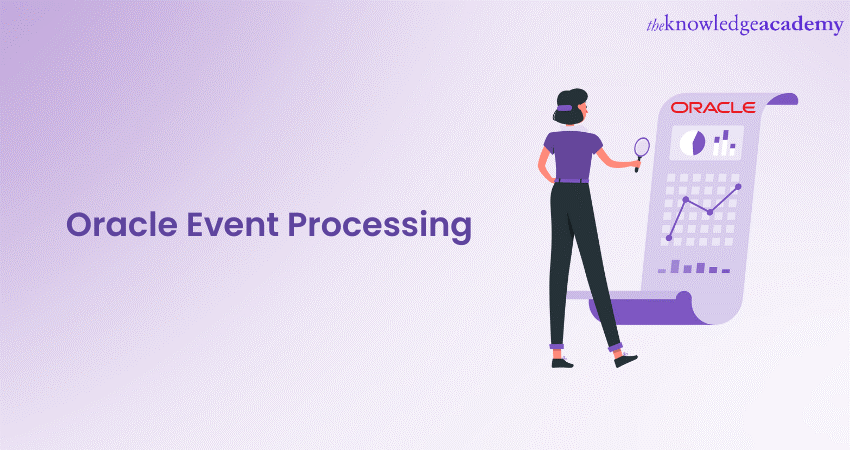
Oracle Event Processing (OEP) has revolutionised the way enterprises handle and derive insights from real-time data streams. The ability to process and analyse events as they happen is crucial for making informed decisions at a time when the market forces are constantly changing ang evolving.
In 2023, Oracle’s annual revenue was $49.95 billion according to Statista and had a major share in the cloud computing and database management markets. OEP makes use of the data gathered from both these markets. In this blog, we will delve into the intricacies of Oracle Event Processing, exploring its key features, benefits, use cases, and architecture.
Table of Contents
1) Understanding Oracle Event Processing (OEP)
2) Key features of Oracle Event Processing
3) Architecture of Oracle Event Processing
a) Components of OEP architecture
b) Event Processing Network
c) Deployment options
4) Benefits of Oracle Event Processing
5) Use cases of Oracle Event Processing
6) Challenges and considerations
7) Conclusion
Understanding Oracle Event Processing (OEP)
Oracle Event Processing (OEP) stands as a cutting-edge technology designed to capture, process, and analyse real-time events streaming from diverse sources. In an era where data is generated at an unprecedented pace, the ability to harness and interpret this data in real time has become a game-changer for businesses across industries. Oracle Event Processing provides a sophisticated framework to manage this deluge of information, enabling organisations to make informed decisions swiftly and strategically.
At its core, Oracle event processing embraces the concept of event-driven architecture. Unlike traditional data processing methods that focus on batch processing, ORACLE EVENT PROCESSING revolves around the immediate processing of discrete events as they occur, allowing for timely responses and insights. These events could be anything from financial market updates and sensor data from IoT devices to customer interactions on e-commerce platforms.
Oracle Event Processing's real-time event processing capabilities are crucial for several reasons. Firstly, it empowers businesses to detect and react to critical situations promptly, preventing potential losses and ensuring operational continuity. Secondly, real-time event processing facilitates the identification of trends and patterns as they emerge, granting organisations the ability to seize new opportunities or address emerging challenges ahead of competitors.
Incorporating Complex Event Processing (CEP), Oracle Event Processing takes event analysis to a sophisticated level. CEP involves identifying complex patterns within event streams, allowing businesses to uncover insights that would be near-impossible to discern with traditional methods. For instance, ORACLE EVENT PROCESSING could help a financial institution detect fraudulent transactions by correlating multiple seemingly unrelated events in real time.
By processing events with low latency and high throughput, ORACLE EVENT PROCESSING ensures that time-sensitive decisions can be made without unnecessary delays. Its event correlation and pattern matching capabilities, paired with the flexibility to store and analyse events for historical purposes, equip organisations with the tools to gain holistic insights into their operations.
Oracle event processing revolutionises the way businesses interact with data. It shifts the focus from retrospective analysis to proactive decision-making, transforming real-time events into actionable insights. As technology and industries continue to evolve, understanding and harnessing the power of ORACLE EVENT PROCESSING is becoming increasingly vital for businesses to remain competitive and adaptable in the fast-paced modern landscape.

Key features of Oracle Event Processing
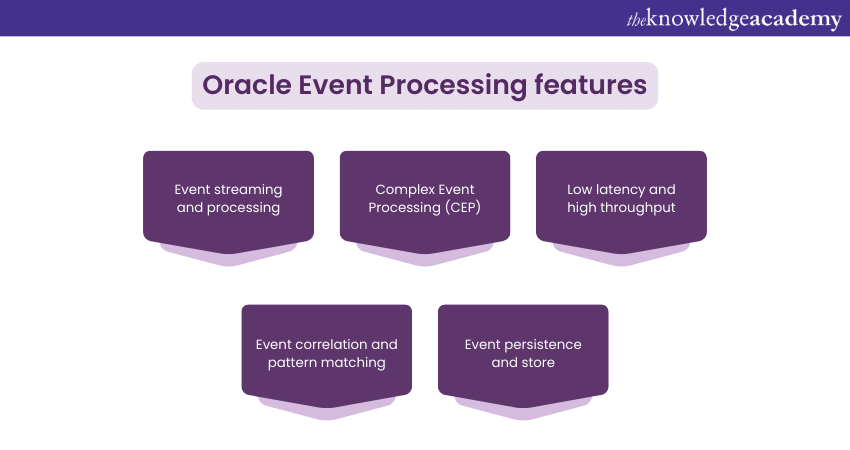
Oracle Event Processing offers a suite of powerful features that make it a vital tool in the world of real-time data processing and analysis. These features empower businesses to harness the potential of real-time events and derive meaningful insights from dynamic data streams. Let's delve deeper into some of the key features that set Oracle Event Processing apart:
1) Event streaming and processing: At the heart of ORACLE EVENT PROCESSING is its exceptional ability to seamlessly ingest, process, and analyse real-time events from diverse sources. Whether it's sensor data from IoT devices, financial market updates, or social media interactions, OEP can handle the rapid flow of events with remarkable efficiency
2) Complex Event Processing (CEP): OEP's CEP capabilities elevate it to the realm of intelligence. It excels at identifying complex patterns within event streams, helping businesses discover hidden correlations, anomalies, and trends that might not be immediately apparent. This ability to discern meaningful insights from intricate data patterns opens doors to proactive decision-making.
3) Low latency and high throughput: Real-time data processing demands speed and efficiency. OEP delivers on both fronts with low latency and high throughput capabilities. It processes incoming events swiftly, ensuring minimal delay in analysing critical information. This feature makes Oracle Event Processing well-suited for scenarios where immediate action is crucial.
4) Event correlation and pattern matching: One of the standout features of OEP is its proficiency in event correlation and pattern matching. It can identify relationships between different events and trigger actions based on predefined rules. For instance, it can detect a series of events that indicate a potential fraud attempt in financial transactions or an anomaly in manufacturing processes.
5) Event persistence and store: While real-time insights are essential, having historical context can be equally valuable. OEP allows businesses to store and manage events, enabling retrospective analysis. This feature is particularly beneficial for regulatory compliance, performance analysis, and long-term trend identification.
Architecture of Oracle Event Processing
The architecture of Oracle Event Processing forms the backbone of its capability to seamlessly process and analyse real-time events from diverse sources. This section delves into the intricacies of OEP's architecture, highlighting its core components, event processing network, and deployment options.
Components of OEP architecture
At the heart of ORACLE EVENT PROCESSING's architecture lie three fundamental components: Event Sources, Event Processors, and Event Sinks.
1) Event sources: These are the origins of real-time events that feed into the OEP system. Event sources can range from IoT devices, sensors, applications, databases, social media feeds, and more. OEP is designed to handle events from a wide variety of sources, enabling the capture of data as it occurs.
2) Event processors: These components are responsible for analysing and processing the incoming event streams. Event processors utilise Complex Event Processing (CEP) techniques to detect patterns, correlations, and anomalies within the data. This layer enables OEP to derive meaningful insights from the raw event data in real time, facilitating prompt decision-making.
3) Event sinks: Once events have been analysed and processed, the results are sent to event sinks. Event sinks can be databases, dashboards, notification systems, or other applications that consume the processed event data. These sinks can trigger actions, generate reports, or provide real-time visualisations to users and other systems
Unlock the Power of Data Management with the Oracle Database 12c Administration Course – Join Today!
Event processing network
The components mentioned above are connected in an event processing network, which defines the flow and transformation of event data within the Oracle Event Processing system. This network structure is crucial in achieving efficient event processing and analysis.
The event processing network is composed of event-driven processors that execute various tasks, such as filtering, aggregation, enrichment, and correlation. These processors are interconnected to allow seamless data flow. ORACLE EVENT PROCESSING allows users to define event-driven processing logic using a visual development environment, making it easier to design complex event processing networks.
Deployment options
Oracle event processing offers diverse deployment options, catering to different business requirements and preferences:
1) On-Premises: Organisations can deploy OEP within their own data centres or on-premises infrastructure. This option provides more control over hardware, networking, and security.
2) Cloud-Based: Cloud deployment involves hosting OEP on cloud platforms, providing scalability and flexibility. This option is suitable for businesses with varying processing demands.
3) Hybrid: A hybrid approach combines both on-premises and cloud deployment models. This allows for a seamless transition of workloads between environments based on workload fluctuations.
4) Edge Computing: OEP can also be deployed at the edge of networks, closer to where the data is generated. This approach reduces latency and enhances real-time processing in IoT and remote monitoring scenarios.
Benefits of Oracle Event Processing
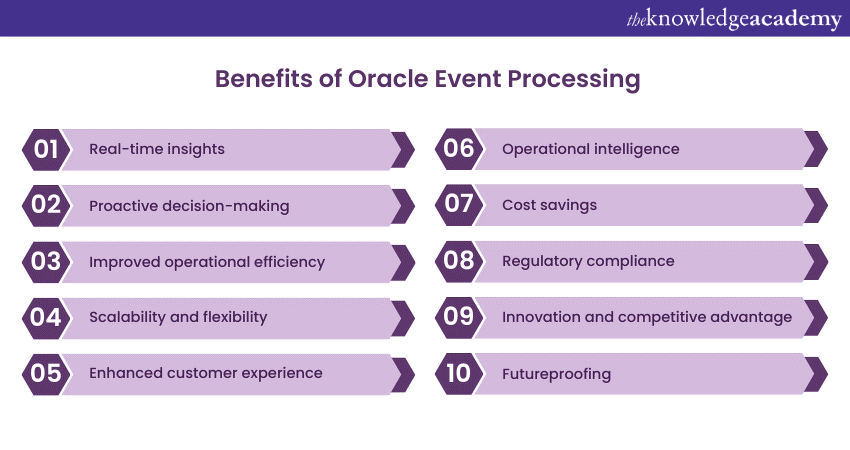
Oracle Event Processing offers a multitude of benefits that empower organisations to harness the potential of real-time data streams for informed decision-making, enhanced customer experiences, and improved operational efficiency. In this section, we delve deeper into the advantages that ORACLE EVENT PROCESSING brings to the table.
1) Real-time insights: One of the most significant advantages of OEP is its ability to provide real-time insights. In a fast-paced business environment, being able to process and analyse events as they occur allows organisations to respond promptly to emerging trends, threats, or opportunities. OEP enables businesses to gain a comprehensive view of their operations in real time, facilitating agile decision-making that can drive competitive advantages.
2) Proactive decision-making: OEP empowers organisations to shift from reactive decision-making to proactive strategies. By continuously monitoring and analysing incoming events, OEP can identify patterns and anomalies that may signify potential issues or opportunities. This proactive approach enables businesses to mitigate risks before they escalate and seize opportunities before they fade, ultimately leading to improved outcomes.
3) Improved operational efficiency: Efficiency is paramount in today's business landscape, and ORACLE EVENT PROCESSING plays a vital role in streamlining operations. With the ability to process and analyse events in real time, organisations can optimise processes, reduce delays, and eliminate bottlenecks. By automating responses based on predefined rules and patterns, OEP enhances operational efficiency and resource utilisation
4) Scalability and flexibility: ORACLE EVENT PROCESSING is designed to handle vast volumes of events without compromising performance. As the volume of incoming data increases, OEP can scale horizontally to accommodate the load, ensuring that real-time analysis remains efficient. This scalability is particularly valuable for organisations dealing with fluctuating event rates, seasonal demands, or sudden spikes in activity.
5) Enhanced customer experience: In the age of customer-centricity, providing exceptional experiences is crucial. ORACLE EVENT PROCESSING enables organisations to gain insights into customer behaviour, preferences, and sentiment in real time. By analysing events such as customer interactions, purchase history, and social media mentions, businesses can tailor their offerings and responses to meet customer expectations effectively
6) Operational intelligence: OEP provides a comprehensive view of the entire operation, helping organisations identify inefficiencies, bottlenecks, and areas for improvement. This operational intelligence empowers management to make data-driven decisions for optimising processes, allocating resources, and enhancing overall performance.
7) Cost savings: By identifying and resolving issues in real time, ORACLE EVENT PROCESSING can help reduce operational costs. For instance, in industries like manufacturing and logistics, OEP can detect equipment failures or supply chain disruptions promptly, preventing costly downtime or delays.
8) Regulatory compliance: In industries with strict regulatory requirements, ORACLE EVENT PROCESSING can play a pivotal role in ensuring compliance. By monitoring events and data streams, OEP can flag potential compliance breaches and trigger immediate corrective actions, reducing the risk of penalties or legal issues
9) Innovation and competitive advantage: Organisations that adopt ORACLE EVENT PROCESSING are better positioned to innovate and stay ahead of the competition. The ability to leverage real-time data for insights allows for the rapid development of new products, services, and business models, fostering innovation and maintaining a competitive edge.
10) Futureproofing: As technology continues to evolve, ORACLE EVENT PROCESSING provides a futureproof solution for managing the increasing velocity and complexity of data. With its integration capabilities, OEP can seamlessly incorporate emerging technologies such as artificial intelligence and machine learning, ensuring organisations stay relevant in a rapidly changing landscape.
Unlock the Power of Data with our Oracle SQL Fundamentals Course – Register Now and Master the Language of Databases!
Use Cases of Oracle Event Processing
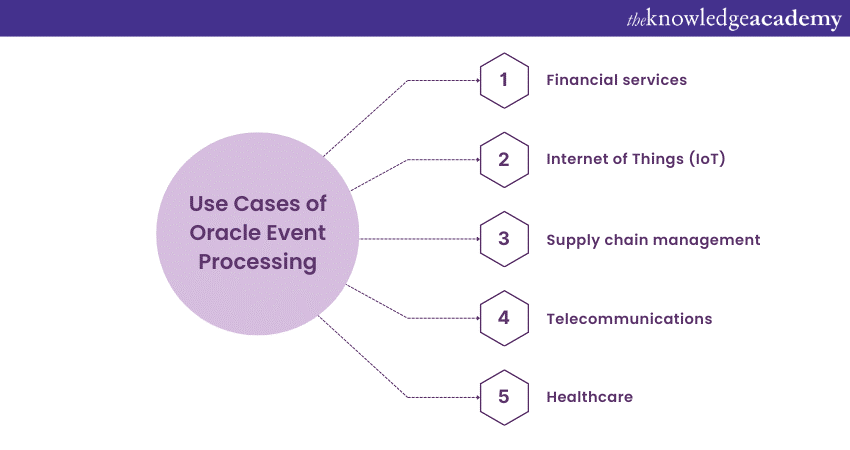
Oracle Event Processing finds its application across a spectrum of industries, demonstrating its versatility in harnessing real-time data streams for improved decision-making, operational efficiency, and enhanced customer experiences. Here, we delve into some compelling use cases that showcase the impact of Oracle Event Processing in various sectors:
1) Financial services: In the realm of financial services, milliseconds can make a significant difference. ORACLE EVENT PROCESSING is leveraged to detect fraudulent transactions in real time by analysing patterns, identifying anomalies, and triggering alerts or preventive actions. It enables banks and financial institutions to respond swiftly to market changes, monitor trading activities, and manage risk exposure with agility.
2) Internet of Things (IoT): As IoT devices proliferate, ORACLE EVENT PROCESSING plays a pivotal role in processing the immense volume of data generated by sensors and connected devices. For instance, in smart cities, OEP analyses real-time data from traffic sensors, weather stations, and public transport systems, enabling efficient traffic management, resource allocation, and incident response.
3) Supply chain management: Managing the supply chain demands accurate visibility into various processes. ORACLE EVENT PROCESSING facilitates real-time monitoring of shipments, inventory levels, and production processes, allowing businesses to optimise routes, predict demand, and minimise disruptions. It can also detect supply chain bottlenecks and trigger timely interventions.
4) Telecommunications: In the telecommunications industry, ORACLE EVENT PROCESSING handles the continuous flow of data from network devices and applications. It can detect network anomalies, predict outages, and optimise bandwidth allocation for improved network performance. Furthermore, OEP can enhance customer experiences by enabling real-time personalisation of services based on user behaviours and preferences.
5) Healthcare: ORACLE EVENT PROCESSING's real-time analytics are invaluable in healthcare settings. It can monitor patient vital signs, identify potential health risks, and trigger alerts for medical professionals in critical situations. For instance, OEP can analyse data from wearable devices to detect irregular heart rhythms and promptly alert medical personnel.
Challenges and considerations
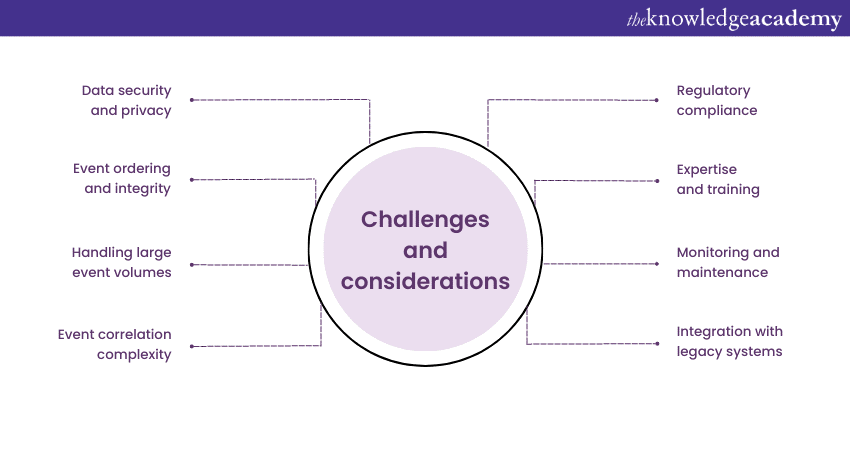
While Oracle Event Processing offers a powerful solution for real-time event analysis and insights, there are certain challenges and considerations that businesses must address to ensure successful implementation and operation. Understanding and mitigating these challenges is essential for maximising the benefits of OEP and maintaining the integrity of data processing.
1) Data security and privacy: In the realm of real-time event processing, data security and privacy emerge as critical concerns. As events are processed and transmitted in real time, ensuring the confidentiality and integrity of sensitive information becomes paramount. Organisations must implement robust encryption protocols, access controls, and authentication mechanisms to safeguard data from unauthorised access or breaches.
2) Event ordering and integrity: Maintaining the correct order and integrity of events is vital for accurate analysis and decision-making. In a distributed environment where events may arrive out of sequence or be subject to network delays, ensuring event ordering can be challenging. Implementing mechanisms for timestamping, event sequencing, and error handling is essential to maintain the fidelity of event data.
3) Handling large event volumes: Real-time event processing often involves handling massive volumes of data streams, which can strain processing resources. Scaling the infrastructure to accommodate varying event loads is necessary to prevent bottlenecks and ensure low latency processing. Employing technologies such as parallel processing and load balancing can aid in managing the influx of events effectively.
4) Event correlation complexity: While OEP excels at identifying patterns and correlations within event streams, complex correlations can strain processing capabilities. Businesses must carefully design event correlation logic to strike a balance between accuracy and performance. Fine-tuning pattern matching algorithms and defining relevant thresholds are key considerations to avoid false positives or missed opportunities.
5) Integration with legacy systems: Integrating OEP with existing legacy systems and data sources can be a complex endeavour. Ensuring seamless data flow and compatibility between diverse systems requires careful planning and often necessitates middleware or API integration solutions. Compatibility testing and thorough documentation can streamline the integration process.
6) Monitoring and maintenance: Real-time event processing environments demand continuous monitoring and maintenance. Rapidly changing data streams and processing requirements require vigilant oversight to identify anomalies, bottlenecks, or failures. Establishing comprehensive monitoring and alerting mechanisms is crucial to swiftly address any issues that arise.
7) Expertise and training: Effectively utilising OEP demands a skilled workforce capable of understanding the nuances of event processing and the intricacies of the platform. Investing in training and upskilling employees ensures that the platform is used optimally, reducing the likelihood of errors and enhancing the quality of insights derived.
8) Regulatory compliance: Industries such as finance, healthcare, and telecommunications are subject to stringent regulatory frameworks. Implementing OEP while complying with industry-specific regulations requires a comprehensive understanding of legal requirements and the ability to design event processing workflows that align with these standards.
Conclusion
Oracle Event Processing emerges as a powerful solution for real-time data analysis and decision-making. Its seamless integration with Oracle's ecosystem, versatile event processing capabilities, and scalability make it a valuable tool for businesses. Embracing OEP can lead to enhanced operational efficiency and informed strategic choices.
Elevate your skills with comprehensive Oracle Training and unlock new opportunities in the world of database management.
Frequently Asked Questions
Upcoming Programming & DevOps Resources Batches & Dates
Date
 Oracle Database 12c: Administration
Oracle Database 12c: Administration
Mon 2nd Sep 2024
Mon 2nd Dec 2024







 Top Rated Course
Top Rated Course


 If you wish to make any changes to your course, please
If you wish to make any changes to your course, please


